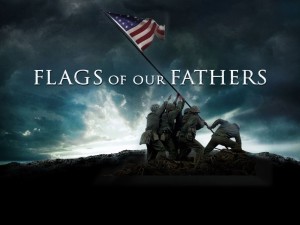FLAGS OF OUR FATHERS: 2 ½ STARS
 Clint Eastwood’s new film Flags of Our Fathers challenges viewers to rethink their notion of the word “hero.” It’s an important message in an era where words like “hero” are thrown around willy nilly, too bad it isn’t presented in a better or more interesting film.
Clint Eastwood’s new film Flags of Our Fathers challenges viewers to rethink their notion of the word “hero.” It’s an important message in an era where words like “hero” are thrown around willy nilly, too bad it isn’t presented in a better or more interesting film.
The movie explores the famous raising of the flag at Iwo Jima during a bloody 1945 battle that lasted one-month and left 6,800 Americans dead. Despite the human cost of the conflict, a photograph of five Marines and one Navy corpsman hoisting the American flag on top of Mount Suribachi became the iconic image of World War II. Using a series of flashbacks, Eastwood tells the story of the combat, the subsequent use of the three surviving flag raisers as propaganda tools by the US government and one son’s quest to uncover the story of his father’s involvement.
Most interestingly he uncovers how that famous image was used to sell the idea of victory to a country tired of war. The three surviving soldiers from the photo are labeled heroes and brought back to the US to help raise money for the war effort. The trouble is, they don’t see themselves as heroes. The real heroes, they say, are lying dead on the battlefield.
The idea of using the hero figure to sell a war is a timely and interesting idea, and will likely generate conversation post theatre, but the movie is all concept. For the most part the characters are loosely drawn and with the possible exception of Adam Beach’s character, the Native-American Ira Hayes, we don’t get to know them very well.
A confused story structure with endless flashbacks doesn’t help. Eastwood stages some very effective scenes, one in which the guys recreate the flag raising on a giant paper mache mountain in a sports stadium is particularly good, but he can’t seem to resist cutting away to battle scenes that don’t further the story.
Flags of Our Fathers is a movie about a flag raising that doesn’t wave the flag, that encourages thoughtful debate about the public face of war, but is unfortunately flawed by muddled storytelling.
